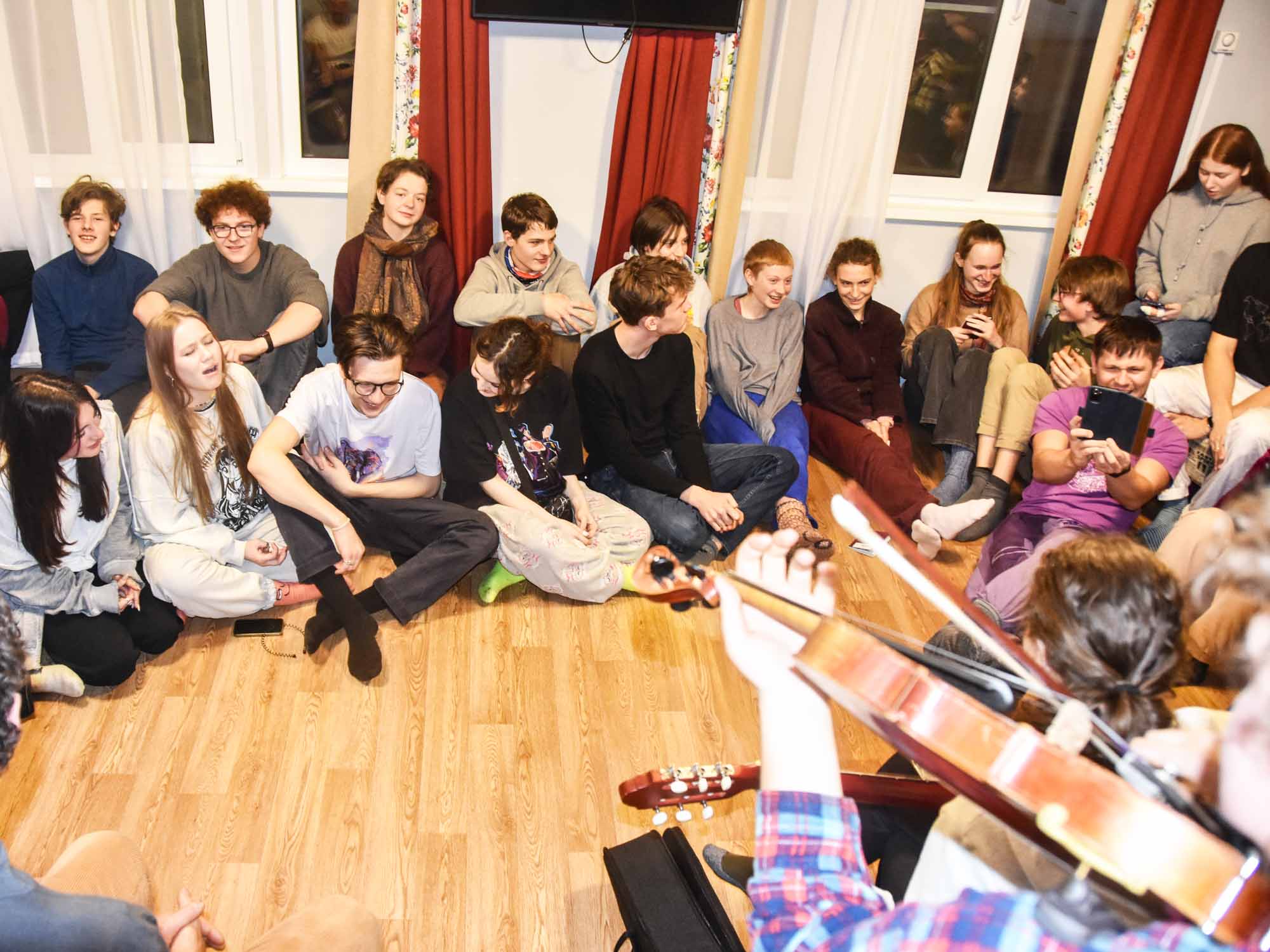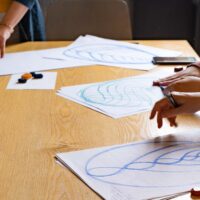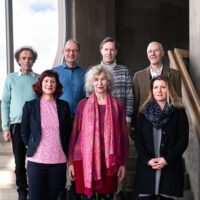The Waldorf Schools in Weimar and Erfurt keep the partnerships with their Russian friends alive despite the war. This school exchange has a long tradition. Frank Scholwin accompanied the pupils as a parent. Here are a few impressions from their stay in Moscow and their collaboration in Vologda in the Russian winter.
From February 10 to 25, 2023, our group of 18, most of them students, went to Russia for an exchange with two Moscow Waldorf Schools. Because there were no direct flights, we took a public bus from the Hermsdorf highway junction near Weimar in Germany to Kaliningrad and flew from there to Moscow. After a week in the Russian capital, we took the sleeper train to Vologda and from there a bus to Kirillov, the White Lake region around 500 kilometers north of Moscow.
While we were in Moscow, we were accommodated individually or in pairs in Russian Waldorf families; we attended classes in the morning and undertook various outings into town in the afternoon. We worked together n the Kirillov area every morning. We did chalk drawing, grafted apple trees, and worked in a piece of woodland. The apple trees, which are planted in local schools and park projects, will also help the local tree nursery ‹Gardens of the North› to preserve varieties that thrive in the Nordic climate with its cold winters and dry summers. In the forest, we created light by removing dead wood and making space for the next generation of trees and for the unhindered growth of final crop trees. Some of these trees were pruned up to the crown to promote growth.
Now is the right time!
On our trip to Russia, we were greeted with great friendliness at the border. The many saws we had with us attracted particular interest when our suitcases were screened, but once we had explained that our students were going to work in the Russian forest, we were waved through benevolently. In Moscow, we were expected and warmly welcomed by the families. Our feelings were mixed because we weren’t sure how we would communicate, but we were also confident that together we would overcome any difficulties. In some cases communication was only possible in Russian and, while this was a bit of a challenge at first, the students found later in looking back that this had been particularly enriching. It was one of the reasons for our trip after all.1 Although much of the conversation was in English, there were many attempts both on the German and Russian side to learn or improve each other’s language. Our Russian hosts entertained us enthusiastically in many ways that are typical of the region, allowing us to enter deeply into their life and culture. We had already heard from a former project, where the Moscow and Weimar Waldorf schools had worked together in France in the fall of 2022, including a Ukrainian student from the Weimar group, that not only the students but the parents in particular began to see the global situation and people in Germany and Russia with different eyes.

As a German-Russian group, we were quite conspicuous on our outings because not many Western Europeans are traveling in Moscow right now. We were asked several times who we were and why we were there, and people were always happy and relieved to hear that we sought and established human relationships against all odds. From what we heard — from interested passers-by, our host families, people in the school in Moscow, or in a conversation with a taxi driver — it became clear to us that the much-discussed conflicts are a matter of global politics and not of individuals or the populations of the countries involved. It really feels right to have made this trip at this time!
In the school, which has three to four streams, demand grew while we were there for the German students to attend their classes to have conversations, in all grades from third to tenth. Especially in the German and English classes, we were welcomed with genuine interest and asked many questions, so that a very lively exchange evolved.
Afterward, we heard from the teachers that many students now want to learn German intensively so that the exchange can continue. The encounter brought a language to life for them that had so far seemed rather remote, to the extent that some grades drew pictures for us and brought gifts for other grades at the Weimar School to the airport when we left, as a first greeting to German students who will come to Russia in the future.
Heartfelt
In Northern Russia, we stayed in Russian-German community houses, ten people per house. We worked together in the mornings, and in the afternoons, we had outings in the area, visited the ‹banya› (Russian sauna), or went skiing. The long evenings were spent together in smaller or larger groups. We sang German and Russian songs together, laughed, played, chatted, learned from instructive presentations, and practiced communal dances accompanied by guitar and violin. Helped by this diverse program, close connections were forged between the German group and around 30 Russian students.
I had never been on such a moving trip, where 16- to 18-year-old students said good-bye to each other so warmheartedly, unwillingly, and full of promise as on our departure at Moscow airport, when we only just managed to get on the plane before the gates were closed.
What happened next?
The return visit took place in mid-April, after Easter. The group had to travel via Turkey. The Russian students came to us for a week’s craft activities in Mecklenburg-Vorpommern (wattle and daub, organic bakery, fruit tree care) and one week of school in Weimar and Erfurt. From our side, too, there is a strong wish to continue and expand contact as in previous years, with regular exchange trips and working together. It needs continuity and regular personal meetings to build trust and establish a deep connection. There are challenges, such as getting the necessary visas from the German Embassy or the rising travel costs that are almost unaffordable for some families, but they somehow make it possible nonetheless. Any donation, however small, would be appreciated. Our charitable association ‹Biologisch-Dynamische Bildung und Forschung in Russland› (Biodynamic Training and Research in Russia) can issue donation receipts. Additionally, we support the construction of two Biodynamic farms in the village of Trushkovo in Kaluga Oblast, three hours south of Moscow. They will be training centers with accommodation for students from the nearby state, Waldorf schools in Moscow, and from Germany. A seminar building is also in the process of being constructed. Here, too, any active and/or financial support is highly welcome.
What was most valuable about this trip? «All the moments when my preconceptions were replaced by real, wonderful experiences,» is how one student put it when we said farewell.
Contacts
Klaus Wäschle
Frank Scholwin
Translation Margot M. Saar





